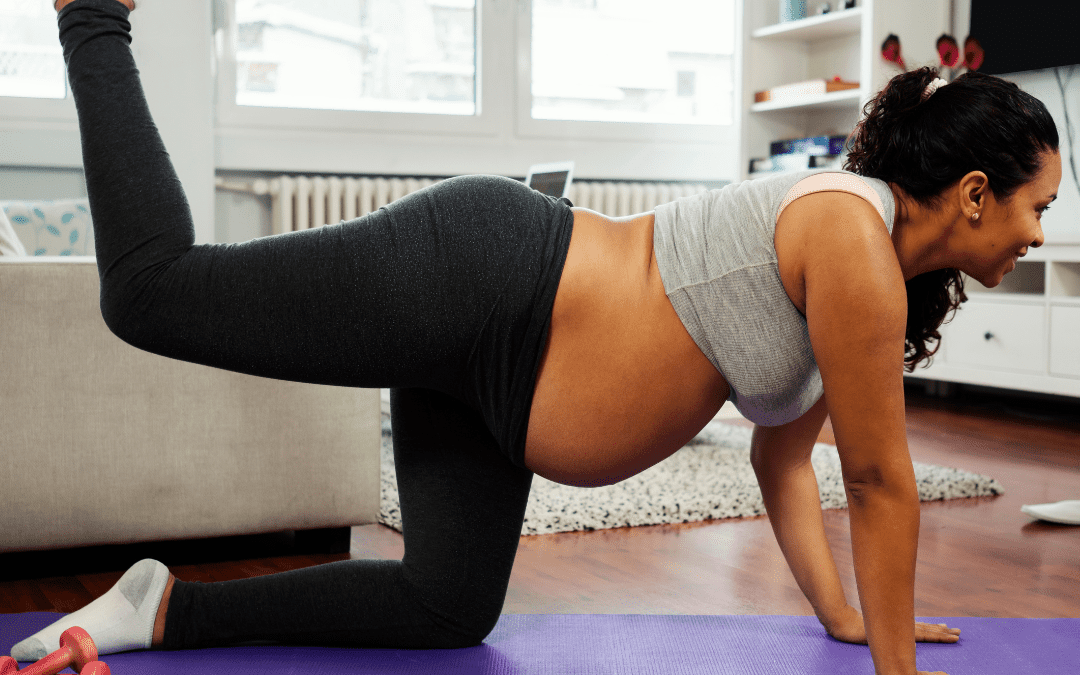How to adapt your exercise for each trimester of pregnancy
Firstly, just to clarify – YES, it is safe to workout when you’re pregnant. In fact, there’s a lot of positive evidence supporting the benefits of doing exercise when you’re expecting a baby. If you’re exercising when pregnant however, you’ll need to understand how to adapt your exercise for each trimester of your pregnancy to stay safe.
In this blog, we look at each trimester of your pregnancy and explain how to scale your exercise program for you and your growing bump.
The benefits of exercising when pregnant
Exercising while you’re pregnant can help manage:
- musculoskeletal pains
- pelvic floor dysfunction
- gestational diabetes
- gestational hypertension
- mental health
- gestational weight gain.
Also.. just so you know… exercising regularly throughout your pregnancy has been associated with a shorter first stage of labour, and faster recovery outcomes. I’M SOLD!!
Adapting your exercise for each trimester of pregnancy
When you’re pregnant, you’ll need to change how you exercise – it doesn’t need to stop though!
Engaging in appropriate resistance and aerobic training in the second and third trimester is recommended. This will help you stay stronger and fitter, and prepare your body for labour and the physical demands of looking after a newborn.
What exercise should you be doing in each trimester?
Here are some ideas of the type of exercise you should be doing in each trimester of your pregnancy.
Trimester 1:
- If you’re a regular exerciser, you can continue your current exercise program, avoiding any high-risk activities (such as contact sports).
- You’ll need to monitor intensity levels and avoid over-heating. You may want to invest in a device to monitor your heart rate.
- If you’re new to exercise, now is the time to slowly introduce light intensity exercise under the supervision of a professional. Pilates is a great place to start.
- TOP TIP: Remember to work around morning sickness by picking times of the day you generally feel good. Be flexible with how your body feels.
Trimester 2:
- If you’re a regular exerciser, now is the time to start tapering your exercise intensity and modifying exercises.
- Pregnancy hormones increase joint laxity and can affect the stability of some joints, therefore avoiding high-strain movements, such as twisting to avoid injury.
- Strength training is a great way to support your joints.
- Avoid exercises that involve lying on your back. This is to avoid the weight of your baby squishing a vein.
- Be aware of swelling and fluid retention. This is completely normal, and regular movement can help keep fluid moving, you may need to modify exercises if they feel uncomfortable.
- Gestational diabetes can start during the second trimester, you may need to monitor your glucose levels and eat appropriately around exercising.
Trimester 3:
- Be aware that your centre of gravity has shifted now that bubs is well and truly popping. This can make some balancing exercises difficult and lifting technique is more important than ever.
- Your abdominals have also separated, allowing space for the baby to grow (called diastasis recti). The right type of exercises can reduce the severity and increase recovery time post-natal. Appropriate core and pelvic floor exercises should be performed on a regular basis, emphasis on breathing.
- Avoid overheating and exposure to hot environments. Make sure you stay well hydrated and choose the cooler part of the day to exercise.
- Appropriate exercise is still safe during this stage! Don’t worry, bubs will be happy just floating around inside whilst you do the hard work. Our bodies are good at keeping them safe and happy.
Every pregnancy is different and it’s important to seek advice from your doctor and medical team. If you are unsure what type of exercise is appropriate for your trimester, or some niggles have started popping up, please get in contact with us, we’re always here to help.
Molly, Exercise Scientist at PPG
Don’t forget….
Molly runs pregnancy and post-partum clinical pilates classes at PPG on Friday at 9am and 2pm. You can book online now!
Read more about post-partum exercise in Molly’s blog.

